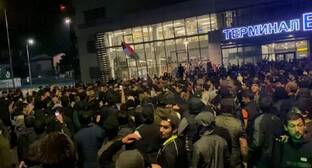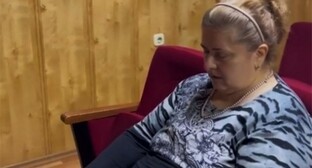01 January 2018, 10:00
Week in the Caucasus: review of main events of December 25-31
CTO of Georgian law enforcers in Pankisi Gorge; the nomination of Dagestan Mufti’s wife for Russian presidency; Facebook’s explanation of blocking Kadyrov's accounts – read about these and other events in the Caucasus that happened during the week of December 25-31, 2017, prepared by the "Caucasian Knot".
Georgian SSS detains five suspects of links with Akhmed Chataev
On December 26, in the course of a counterterrorist operation (CTO) conducted by the Georgian State Security Service (SSS) in the villages of Omalo and Duisi in the Pankisi Gorge, five Georgian citizens were detained. SSS agents assert that the detainees were linked to Akhmed Chataev, who was killed in a CTO held in Tbilisi on November 21-22. Four of them were accused of supporting terrorism and arrested.
One of the detainees, the 19-year-old Temirlan Machalikashvili, was hospitalized with a serious wound to his head. According to the SSS, agents wounded him when he tried to throw a grenade at them. However, his relatives refute this version; and on December 27, the Prosecutor's Office began a check in connection with his wound of a possible abuse of power by agents. They had no need to shoot at Machalikashvili, as Mariam Kublashvili, his advocate, stated. On December 30, doctors reported aggravation of his condition.
“EcoWatch” leader Andrei Rudomakha hospitalized after being attacked in Krasnodar
On December 28, unidentified men attacked Andrei Rudomakha, the coordinator of the "Ecological Watch for Northern Caucasus" (EcoWatch) and his companions in Krasnodar. Andrei was hospitalized with a head trauma and fractured nose. The attackers took away ecologists’ computers, photo and video cameras and documents. Rudomakha has linked the attack with his environmental activities. The attackers acted in an orderly manner and could be related to law enforcers, Andrei and his associates believe.
Wife of Dagestani Mufti runs for Russian presidency
Russia has launched the presidential election campaign with the voting scheduled for March 18, 2018. On December 25, Aina Gamzatova, the editor-in-chief of the “Islam” magazine and the wife of the Mufti of Dagestan, sent her documents to the Central Election Commission (CEC) for registration as a candidate. Her nomination was supported by 542 people, including well-known public figures, spiritual leaders, scientists and athletes of Dagestan. The nomination became a controversy subject among political analysts. The experts, interviewed by the "Caucasian Knot", suggested that Aina’s decision was not agreed with the Kremlin, but even an attempt to participate in the election provides candidates with a chance to become Russian-scale public figures.
Facebook treats Kadyrov's putting on sanctions list as reason for blocking his accounts
The accounts of the head of Chechnya, Ramzan Kadyrov, on the Facebook social network and on the Instagram service were blocked because of adding him to the US sanctions list, the Facebook administration confirmed on December 27. On December 20, the US Treasury added Kadyrov to the "Magnitsky list" claiming him responsible for extrajudicial executions, torture and other human rights violations in Chechnya. After that, Kadyrov announced the launch of a local social network named Mylistory and opened his account there. He was followed by Chechen officials and agencies; many of them switched over to Mylistory and closed their Instagram accounts. Local observers have suggested that this contributed to an active promotion of Mylistory. Employees of Chechen budget-funded organizations told that they received instructions to open their accounts in the Mylistory.
Residents of South Ossetia stay three days without electricity
O December 23, because of an accident, residents of South Ossetia has power supply outage. A huge shower broke power lines; and on December 25, authorities of South Ossetia asked Russian Ministry for Emergencies (MfE) to help in eliminating the breaks. Residents of Tskhinvali complained that power outages were followed by interruptions of water and heat supplies, while all the domestic candles were sold out. The electricity supply was restored only on the fourth day, on December 26.




